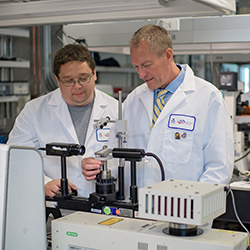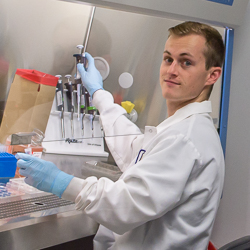UA Scientists Awarded Space Research Grant
The Center for Applied NanoBioscience and Medicine is doing its part to protect the health of astronauts on long-duration missions, including NASA’s Journey to Mars.
The Center, located at the University of Arizona College of Medicine – Phoenix, is a co-principal Investigator on a grant awarded to Wake Forest Institute for Regenerative Medicine. The grant will fund research on the effects of simulated space radiation on the human GI tract.
Frederic Zenhausern, PhD, MBA, director of the Center for Applied NanoBioscience and Medicine and a professor at the UA College of Medicine – Phoenix, said UA scientists will provide microfluidic gut microsystem and biodosimetry tools to Wake Forest University scientists. The lab’s share of the $3.4 million grant is $943,000 over four years.
The innovative Human-Microbial Cross-Talk human “gut-on-a-chip” provides a platform for scientists to monitor how solar events and cosmic rays affect humans in space. The grant is 1 of 10 awarded by NASA’s Translational Research Institute at Baylor College of Medicine for research projects in lymphatic flow, radiation damage resistance, minimally invasive surgical techniques and the effects of the microbiome on health during long spaceflights.
“This is the first TRI initiative from NASA’s Human Research Program which will help to solve some of the challenges of health management for astronauts on extended space exploration missions,” Dr. Zenhausern said. “It represents an exciting opportunity to be part of an outstanding group of experts at Wake Forest, NASA and the Lawrence Livermore National Laboratory.”
“The University of Arizona has a long-standing and renowned history of research partnership with NASA, particularly through the Department of Astronomy and Lunar and Planetary Laboratory,” said UA President Robert C. Robbins. “We are so excited to add UA Health Sciences to this tradition of collaboration with the space agency.”
The human gut-on-a-chip provides a platform for studying a biological model of the human gastrointestinal tract that mimics the actual conditions and processes that occur within the gut.
It allows scientists to see how cells from individuals respond to certain drugs or environmental exposure, allowing them to formulate personalized therapies. With organ-on-a-chip technology, researchers can analyze the complex interactions between human cells and the microbial ecosystems of the gut, predicting their effects on health, disease onset or even cognitive performance, and study the action of probiotics, nutritional compounds or drugs.
In 2016, NASA established the Translational Research Institute to research and develop innovative approaches to reduce risks to humans on long-duration exploration missions. The institute was awarded $246 million for six years, and is led by Baylor College of Medicine with partners including the Massachusetts Institute of Technology and the California Institute of Technology.
Media Contact:
Marian Frank
Phone: 602-827-2022
About the College
Founded in 2007, the University of Arizona College of Medicine – Phoenix inspires and trains exemplary physicians, scientists and leaders to advance its core missions in education, research, clinical care and service to communities across Arizona. The college’s strength lies in our collaborations and partnerships with clinical affiliates, community organizations and industry sponsors. With our primary affiliate, Banner Health, we are recognized as the premier academic medical center in Phoenix. As an anchor institution of the Phoenix Bioscience Core, the college is home to signature research programs in neurosciences, cardiopulmonary diseases, immunology, informatics and metabolism. These focus areas uniquely position us to drive biomedical research and bolster economic development in the region.
As an urban institution with strong roots in rural and tribal health, the college has graduated more than 1,000 physicians and matriculates 130 students each year. Greater than 60% of matriculating students are from Arizona and many continue training at our GME sponsored residency programs, ultimately pursuing local academic and community-based opportunities. While our traditional four-year program continues to thrive, we will launch our recently approved accelerated three-year medical student curriculum with exclusive focus on primary care. This program is designed to further enhance workforce retention needs across Arizona.
The college has embarked on our strategic plan for 2025 to 2030. Learn more.